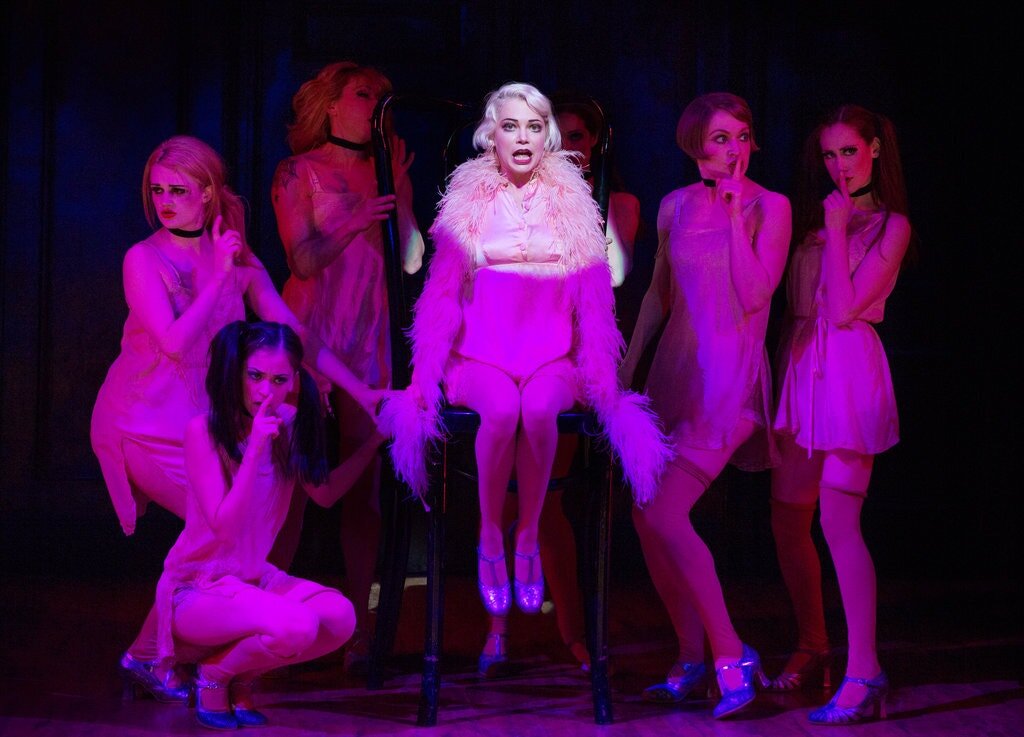Cabaret
Willkommen back, Cabaret. We're happy to see you, indeed.
In a season awash with revivals, the return of Sam Mendes' and Rob Marshall's Tony Award-winning production to its old home, Studio 54, was met with raised eyebrows by some. But this revival of a revival is a happy addition to the spring theatre season, with the return of the wonderful Alan Cumming to the role of the Emcee and the introduction of Michelle Williams to Broadway in the role of Sally Bowles.
Kander and Ebb's musical, with a book by Joe Masteroff, is based on Charles Isherwood's "Stories from Berlin," which was then adapted into John Van Druten's play I am a Camera. Despite its numerous adaptations and interpretations, the musical stands firmly on its own as a solid piece of theatre, a stirring social commentary and a fantastic vehicle for talented performers to display their skills.
The story follows American writer Clifford Bradshaw (played by an excellent Bill Heck), who travels to Berlin in 1929 to work on a novel and is promptly thrust into the seedy nightlife and scary politics of the pre-World War II city. After a chance encounter with Ernst Ludwig (Aaron Krohn), a German businessman, Cliff finds himself at a local nightclub and soon after finds himself entangled with the English show girl Sally Bowles (Michelle Williams). As the two shakily navigate a romance (Cliff is bisexual), the political atmosphere of Berlin rapidly escalates in danger and people are forced to make heart-wrenching choices about their futures.
The entire cast is top-notch, with Cumming returning to the role of Emcee more than 20 years after he first played it in London with apparent zest and pleasure. Decked out in a trench coat, over pants and suspenders, with rouged nipples, he is sassy and sexy, cruel and frightening, all at the same time. He brings both humor and terror to the role, whether he dancing is center stage or silently hovering in the dimly-lit background.
It's difficult to comment on actresses who play Sally Bowles, because Sally herself is a bad actress. She is not supposed to be a good singer, so taking on the role requires another level of artifice. Williams, known for her sensitive, heartbreaking performances that have garnered her two Academy Award nominations, gives a subtle, textured performance as Sally, depicting the desperate anxiety of the woman striving for something more in life. Williams sings and dances capably, and her ability to tell a song through a story is commendable, especially in the rage-filled "Mein Herr" and the desperate journey of the title song, in which her statement, "Life is a cabaret" sounds more like a howl of desperation than it does an affirmation of the fun that life contains.
Joining Cumming and Williams are the always excellent Danny Burstein, playing Herr Schultz, the Jewish man at their boarding house, who romances their landlady, Fraulein Schultz (a wonderful, confident Linda Edmond). The sweet romance between the two contains a tragic element, due to the politics of the day. And Gayle Rankin, playing Fräulein Kost, provides a welcome comedic element, while also offering insight into how women could survive financially at the time. (Spoiler alert ahead.)
What struck me about Cabaret — well, many things struck me while watching this wonderful production - was that both Sally and Fraulein Schultz are alone at the end of the show. Neither of them are particularly happy about being alone, but they are alone — standing still onstage, staring ahead with what I perceived as determination. Their reasons for being alone differ greatly, and Fraulein Schultz's reason is extremely tragic, but she still made the choice on her own, and the conclusion of the play, which is shocking and tragic and brilliant in itself, offers no judgment upon either women. They made their decisions and they are living with them, and no one is judging or patronizing them at that moment. That alone is cause for celebration, as are countless other elements of this production.

